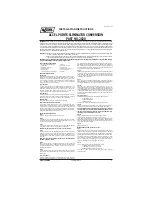
torque by changing the intake air flow
configuration for varying engine speeds.
This helps achieve optimum torque
throughout the entire RPM range.
During engine operation, a closed
resonance valve gives the intake air
charge the dynamic effect of long intake
runners at low to mid-range RPM (up to
3750 rpm). This helps increase torque.
During mid-range to high rpm operation
(above 4100 rpm), the solenoid is
de-energized and the resonance valve is
sprung open. This allows intake air to be
drawn through both resonance tubes,
providing the air volume necessary for
additional power at the upper rpm range.
Note:
The rpm for resonance valve activation
may vary slightly depending on
temperature.
In addition, when the valve is closed, a
dynamic effect is produced. For
example, as intake air is flowing into
cylinder 1, the intake valves will close.
This blocks the onrushing air. The
cylinder 1 air flow will stop and expand
backward (resonance back pulse) to fill
cylinder 5. The resonance wave along
with the intake velocity enhances
cylinder filling.
Engine-General
http://ebahn.bentleypublishers.com/BMW/3/E46/Repair%20Manuals/1...
9 of 19
2/25/2009 9:58 PM
















































